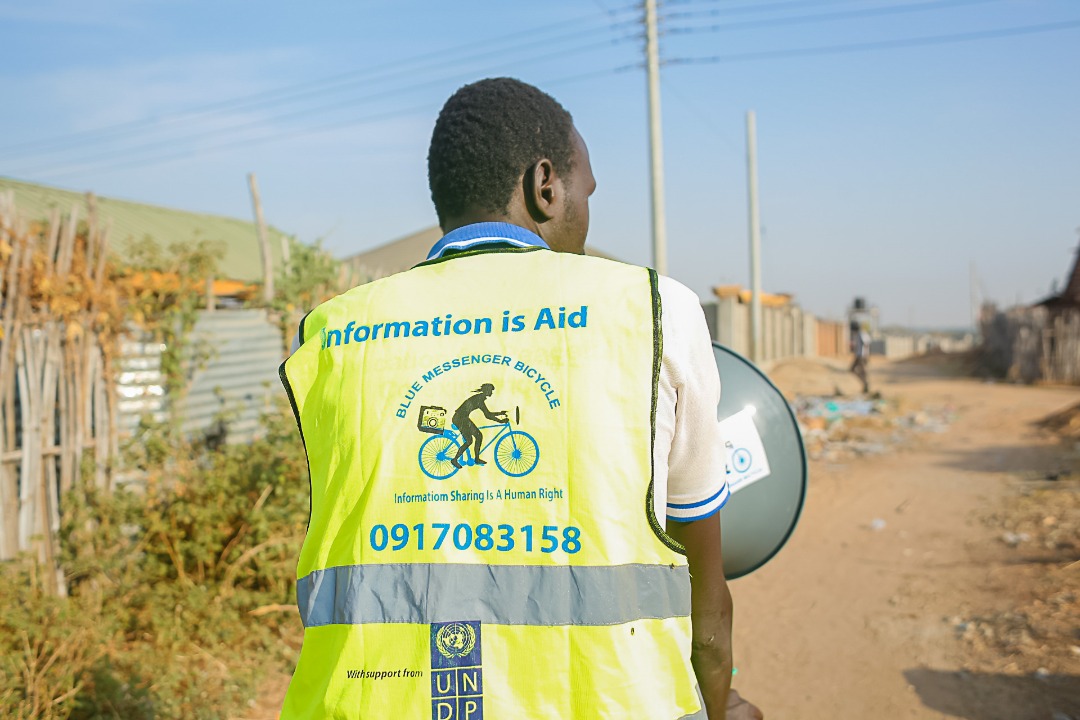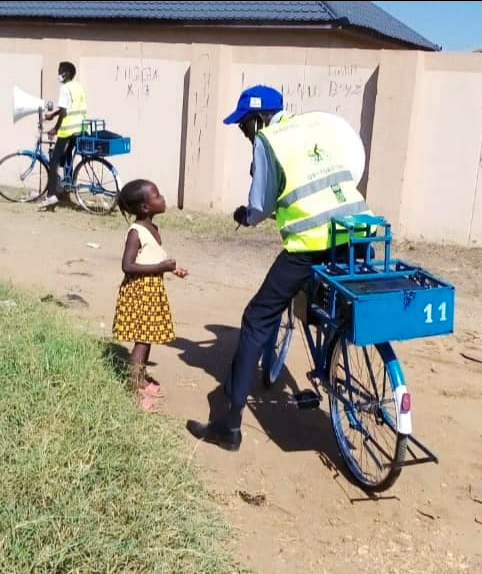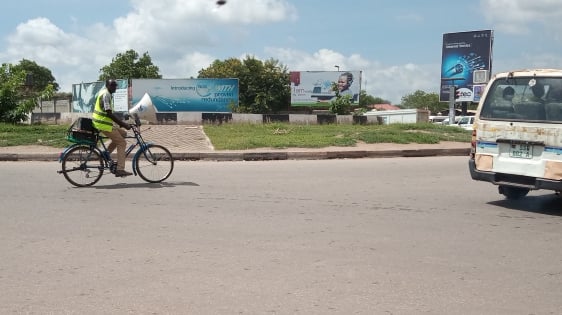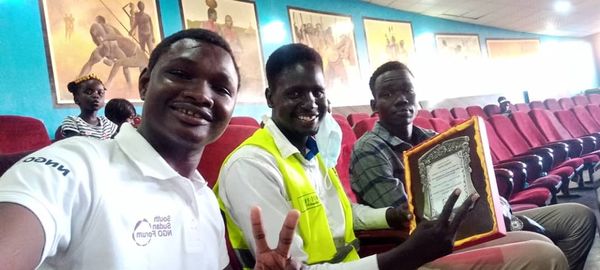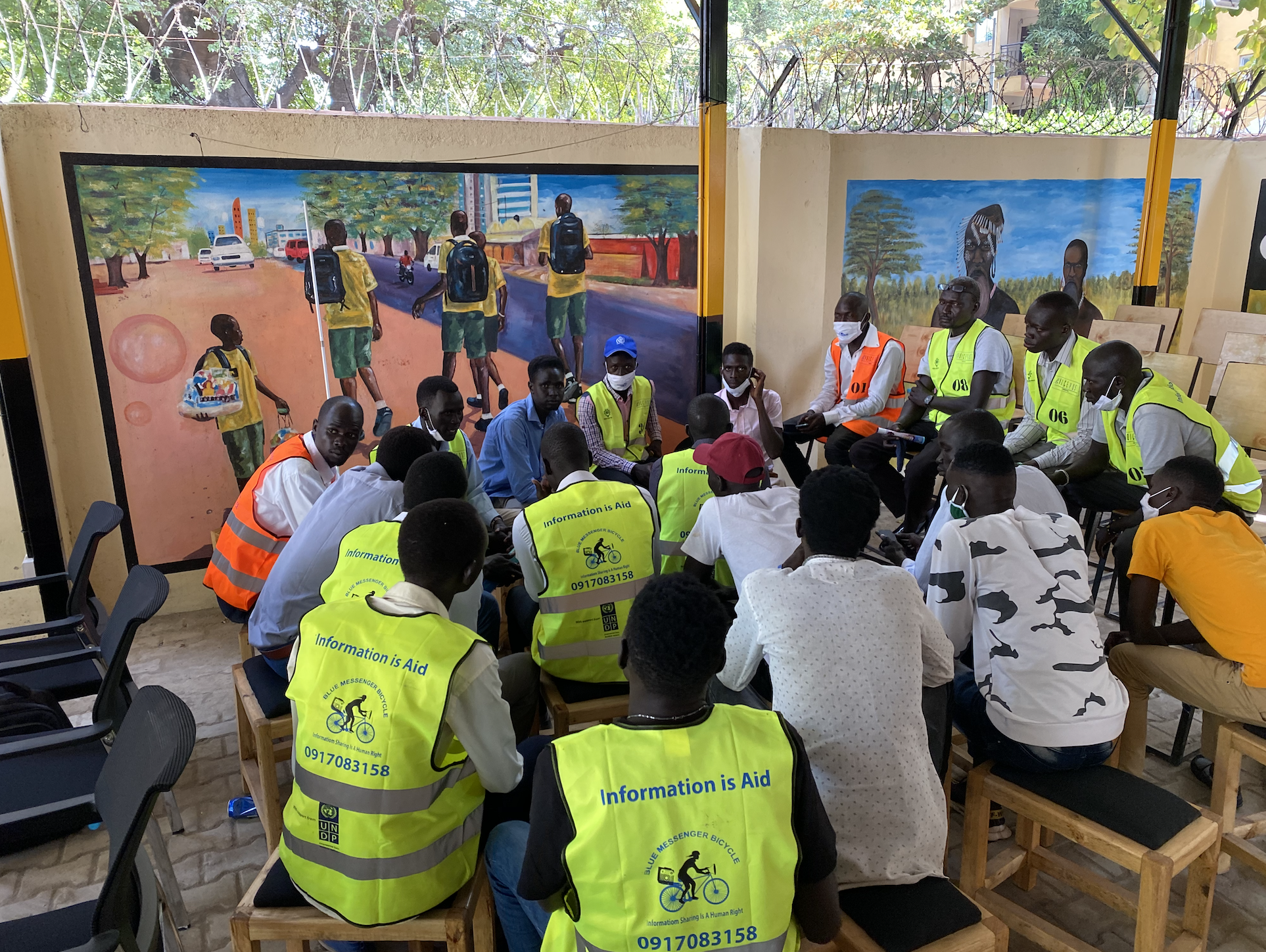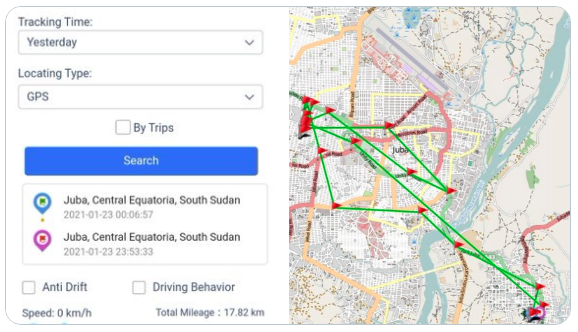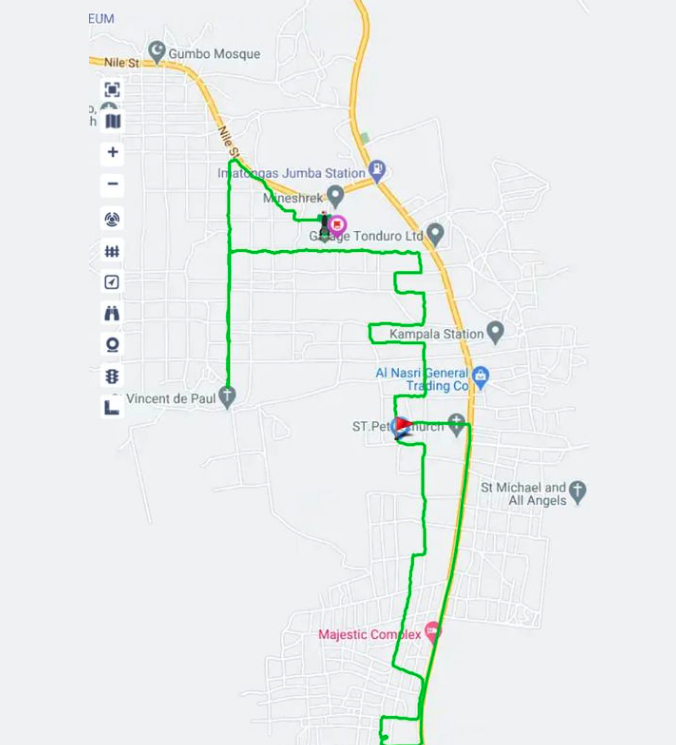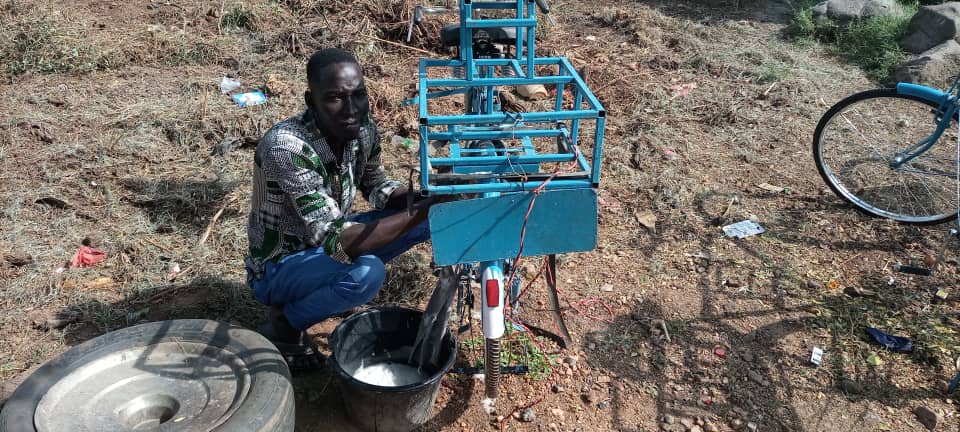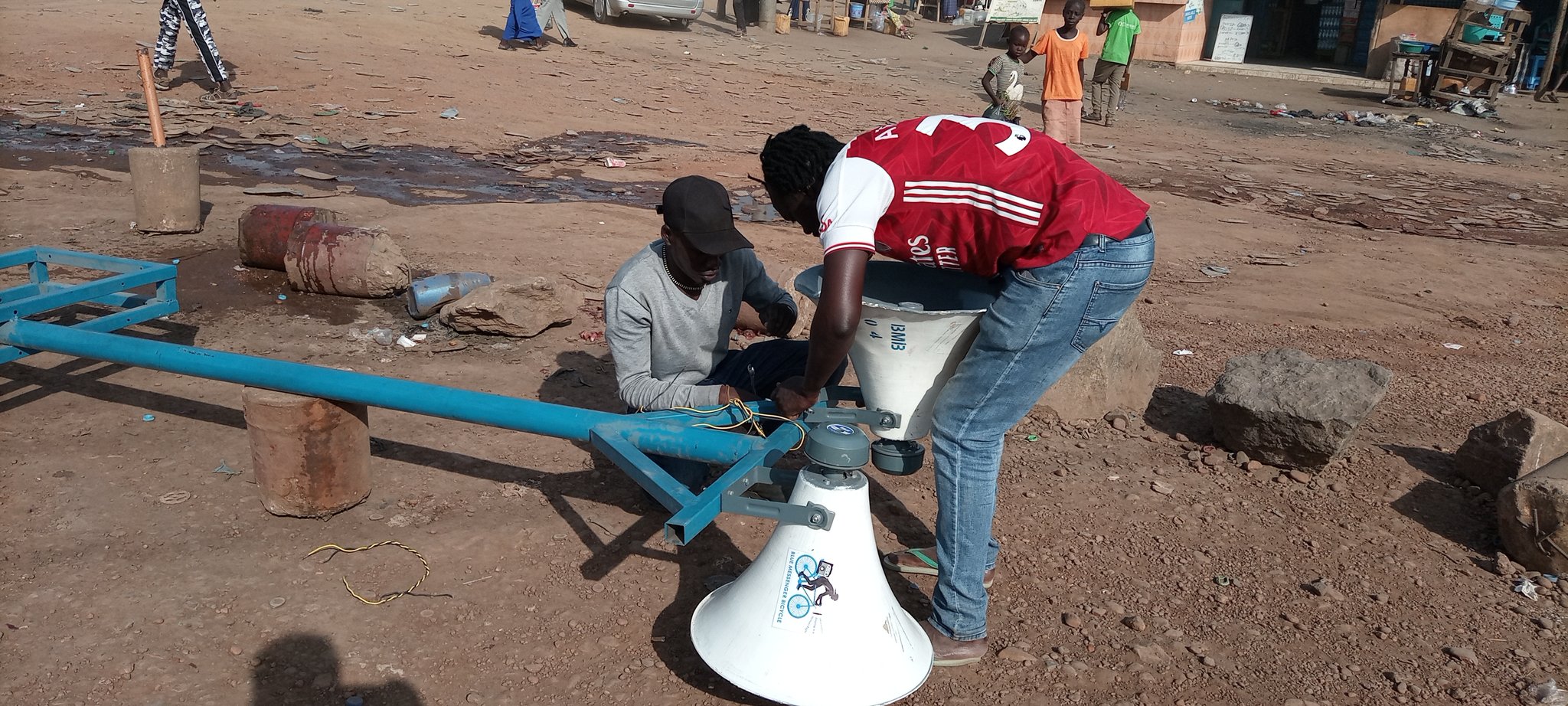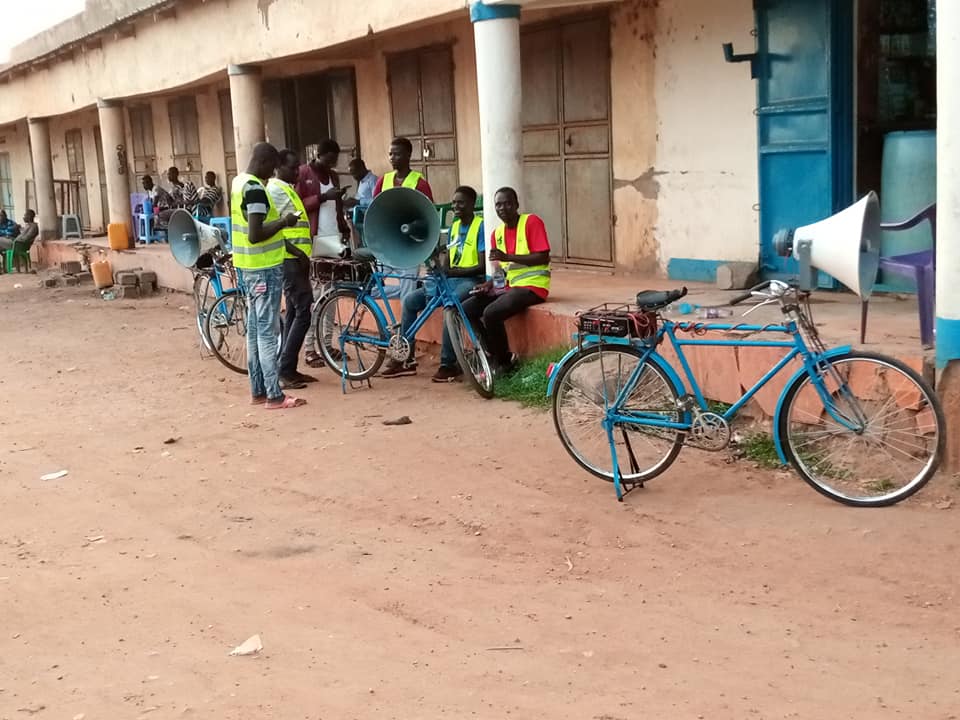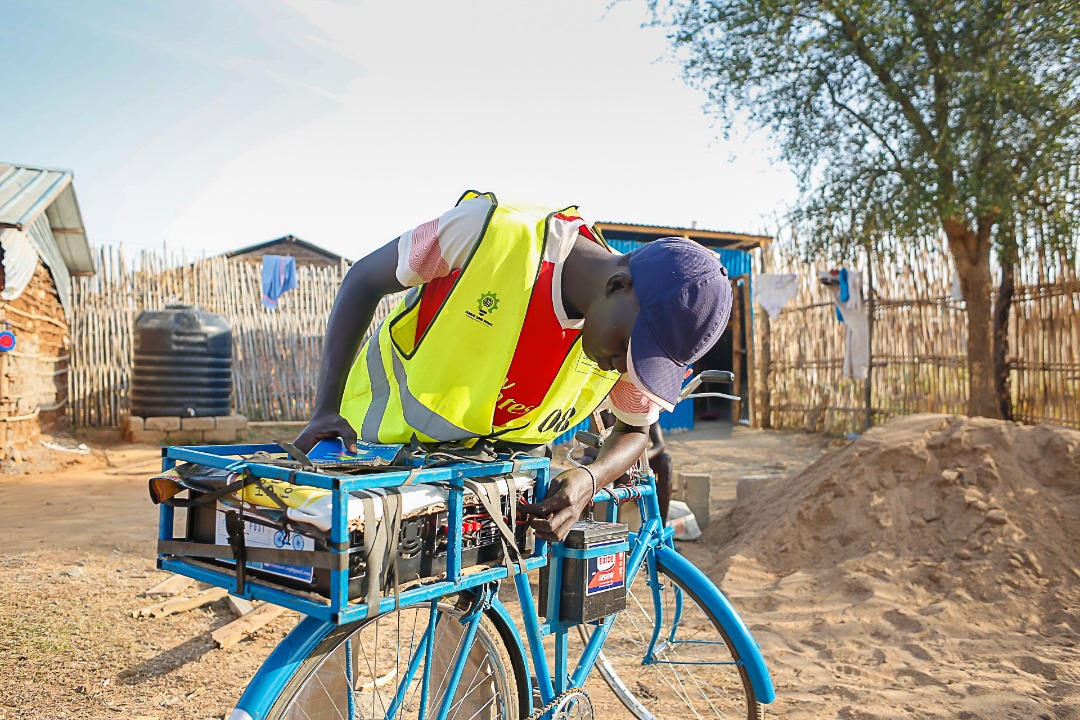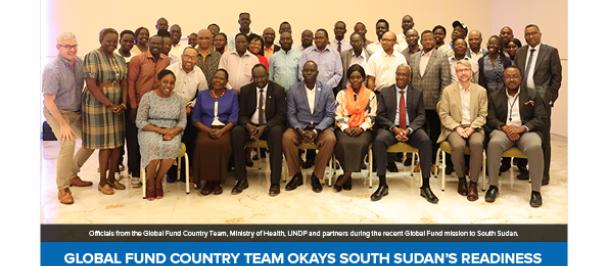A Blue Messenger Bicycle mobilizer getting information out to the community in the Gumbo neighborhood of Juba, South Sudan. Photo: Isaac Buay/https://twitter.com/buay_isaac
One of Voice Post's Blue Messenger Bicycle mobilizers stops to listen to a girl while completing community rounds. Photo: Voice Post
In 2020, South Sudan grappled with historic floods, the COVID-19 pandemic and associated lockdowns, economic fluctuations, and recurrent local conflicts. Many found their families newly displaced or affected by these compounding challenges.
While coping with unpredictable events and movements, the most vulnerable people in South Sudan have less access to life-saving information. Recognizing this vast unmet need in communities, a network of young innovators in South Sudan founded Voice Post as a social enterprise under the slogan “Information is Aid”.
“We believe information is a human right and therefore not affording a radio should not be a barrier to getting informed,” said Atem Peter, one of the Voice Post founders. “We believe two-way communication is more effective in making sure communities are well informed and heard.”
A Blue Messenger Bicycle mobilizer at a Juba roundabout. Photo: Voice Post
The Voice Post team brainstormed an innovative modality for information sharing and launched a pilot in Juba during the onset of the COVID-19 pandemic. Their concept was Blue Messenger Bicycles (BMB), which would go on to win the South Sudan National NGO Forum’s Most Innovative/Transformative Peace-Making Program Award in November 2020.
Bright and strikingly blue, each bicycle is mounted with a megaphone, an amplifier, a battery, and a USB stick. The bikes disseminate recorded messages and collect feedback from communities. After proving their concept worked, and with support and technical expertise from UNDP South Sudan’s Accelerator Lab and Communications Unit, the team received 50 bicycles in October 2020 to expand their reach.
Voice Post's Blue Messenger Bicycles (BMB) team poses with their award after winning recognition as the South Sudan National NGO Forum’s Most Innovative/Transformative Peace-Making Program Award in November 2020. Photo: Voice Post
Grassroots Mass Awareness by the Numbers
One Blue Messenger Bicycle covers 240 households or 1,440 people (calculated as 6 people per household). One bike’s audio reaches 500 meters ahead and 300 meters behind at a time with audio messages.
The team divided Juba into four zones, 13 blocks and 68 villages. They disseminate approved COVID-19 messages in five main languages: Arabic, English, Dinka, Nuer, and Bari, depending on neighborhood and zone.
The Voice Post team with the Blue Messenger Bicycle mobilizers meet at DefyHateNow's Scenius Hub during the official launch of the initiative with UNDP South Sudan in November 2020. Photo: UNDP
Collectively, the program covered 720,000 households in a span of 3 months (October to December 2020); with an equivalent reach of 2,160,000 people informed on COVID-19. When faced with information fatigue, the team shifted messaging to malaria, diarrhea, and polio public health information campaigns. They also collected more than 100 complaints, reports of rumors, and feedback from community members.
“Vulnerable groups such as children, elderly and people with disabilities tend to not move far out of their homesteads. Since BMB passes by their homes while amplifying audio messages with life-saving information, they become delighted and informed,” said Mabior Ajuong, BMB’s programme manager.
Cycles of Learning and Innovation
While the BMB concept is straightforward, no such initiative with similar scalability exists in South Sudan aside from radio. The Voice Post team has spent the past months improving the construction of the bikes, as well as how they track and provide accountability for their riders and their reach.
GPS tracking technology shows timing, geographic reach and when a rider has stopped moving. Photo: Voice Post
The team installed Global Positioning System (GPS) tracking devices in early January 2021. The GPS trackers help with fleet management by reporting geographic coverage and monitoring the movement of the bicycles. When the first GPS trackers they tested began to have technical issues, the team traveled to Uganda to follow up with the manufacturer. They came away from the meeting with an improved device, which will replace the others.
“The GPS data helps us improve our performance by giving our team access to real time information and the ability to generate accurate reports in terms of areas covered daily, weekly and monthly,” said Mabior.
The GPS tracks a rider circulating through Shirkat neighborhood during a polio awareness campaign. In total, 10 kilometers covered and more than 350 households reached with polio campaign messages. Photo: Voice Post
“We also stop regularly to interact with the communities as one of our key indicators. The tracking device will indicate how many times a day a bike stopped and it will be great to capture it in our daily reports,” he added.
Volunteers Driven to Inform Vulnerable Communities
The Blue Messenger Bicycle fleet is powered by 50 volunteers (46 men and 4 women), ranging from high school to university students. In addition to the bright blue hue of their bikes, the teams wear reflectors to maximize their visibility as they cycle with information across Juba.
60 percent of the BMB volunteers are experienced in teaching both at primary and secondary school level. Since teachers are some of the most influential in the community and had lost jobs due to school closure, the initiative recruited them to create awareness.
Each of the four zones in Juba has a designated captain to coordinate efforts, and bicycles are kept in storage spaces in off hours, some are provided pro-bono by the local business community.
Voice Post conducted capacity building trainings with the mobilizers. Their sessions focused on creating a sustainable fleet by equipping zone leaders with the skills to conduct repairs on the amplifiers and megaphones, boost Communication for Development (C4D) inter-personal communication skills and essential road safety.
One of the volunteer community mobilizers cleans and maintains a Blue Messenger Bicycle. 60 percent of the BMB volunteers are experienced in teaching both at primary and secondary school level. Photo: Voice Post
The team is now constructing information poles equipped with loudspeakers in Juba markets and bus parks, with support from the Ministry of Health and Juba City Council.
Beyond Bikes, Beyond COVID-19, and Beyond Juba
The effective work of the Blue Messenger Bicycle team has caught the attention of additional partners in the public health and public information space.
In addition to coordinating with the South Sudan Risk Communications and Community Engagement (RCCE) Technical Working Group, both national and Central Equatoria state ministries of health have engaged Voice Post to carry out a polio vaccination campaign using 20 of the Blue Messenger Bicycles to strengthen awareness and increase demand for the vaccine.
Voice Post also gained support from the Ministry of Health and Juba City Council to construct information poles equipped with loudspeakers in Juba markets and bus parks. The pole in Shirkat is up and running (9AM-12PM and 4PM-9PM), and Konyo Konyo, Custom, Jebel, Gudele I & II, Suk Wewe, Suk Sita, Lologo, Suk Libya and Mia Saba locations are soon to follow.
Yambio, Torit and Yei are future target locations to take Voice Post's BMB initiative beyond Juba. Photo: Voice Post
The team is developing a sustainability plan in consultation with UNDP’s Accelerator Lab, and has begun contacting civil society organizations and businesses with their unique value offer, to fund expansion of the social enterprise initiative in future. They aim to extend Blue Messenger Bicycle services to four target locations in 2021: Nimule (Central Equatoria State), Rumbek (Lakes State), Yambio (Western Equatoria State) and Torit (Eastern Equatoria State).
“We want to expand because we know there are many more contexts in South Sudan where BMB messages can be effective,” said Atem, adding that in Yambio, Torit and Yei there is a rich bicycle culture.
"Did you know in some of these locations a newly wedded woman must be bought a new bicycle by the husband, as a sign of true love? With such positive cultural association, we think bringing BMB’s programme and volunteerism to these communities to disseminate information will add more value to their use of bicycles,” he said.
A BMB mobilizer checks his settings while making community rounds. Photo: Isaac Buay/https://twitter.com/buay_isaac
Follow Voice Post on Facebook and Twitter for additional updates on the progress of Blue Messenger Bicycle initiative. Some photos for this story are courtesy of Voice Post and photographer Isaac Buay.
More coverage of UNDP's COVID-19 response in South Sudan:
Tackling Misinformation for a #HateFreeSouthSudan During COVID-19
GoSanitize: A 'Made In South Sudan' Initiative

 Locations
Locations